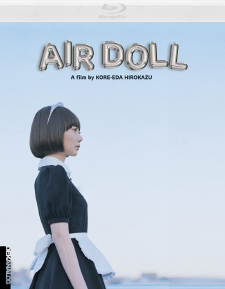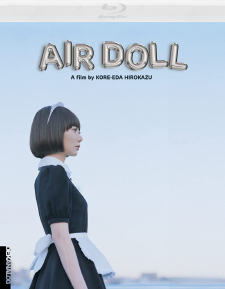Air Doll (Blu-ray Review)

Director
Hirokazu Kore-edaRelease Date(s)
2009 (July 26, 2022)Studio(s)
Dekanalog/Vinegar Syndrome- Film/Program Grade: B
- Video Grade: B+
- Audio Grade: B+
- Extras Grade: D
Review
Air Doll is an unusual but fascinating examination of the intersection between human identity and an increasingly commercialized society, as experienced through the eyes of a sex doll who comes to life spontaneously. While it was released just two years after Craig Gillespie’s Lars and the Real Girl, any similarities between the two are at best incidental. Air Doll is actually an adaptation of the 2000 manga Kuuki Ningyo by Yoshiie Goda, and it’s essentially the reverse of Lars. Gillespie’s film used the relationship between Lars and his inanimate companion as a way of exploring repressed trauma, as well as the difficultly in letting go of loved ones. Air Doll, on the other hand, is entirely from the point-of-view of titular doll, who struggles to understand what it means to be human while interacting with “real” people whose own humanity has been subsumed by their urban environment.
The change in perspective was courtesy of writer/director Hirokazu Kore-eda, as Goda’s manga had tended to center on the people in the doll’s orbit. In Kore-eda’s adaptation, Nozomi (Bae Doona) is a sex doll owned by Hideo (Itsuji Itao), who comes to life after she discovers that she has a heart. She goes out into the city, getting a job at a local video store, where she befriends Juinichi (Arata Iura). Eventually, she finds her way to her own maker (Joe Odagiri), but he’s no Geppetto, and so she has to try to find her own way to understand the nature of humanity.
There’s a vaguely anti-capitalistic theme to Air Doll, as Nozomi starts out as nothing more than a commodity, but since the people around her have been commodified by the industrialization of modern life, they don’t hold the answers that she seeks. She’s a product, surrounded by people who have accepted being treated as products, and their dehumanization holds up a mirror to the emptiness that she feels as a device created to provide empty pleasure. In the film’s most crucial scene, she returns to Hideo, and he’s disappointed that she’s gained life of her own. His prior devotion to her was pure objectification, and he never wanted the complications engendered by authentic human connections. She may have gained a heart, but what value is that when surrounded by heartlessness?
Air Doll doesn’t offer any answers to that question or any others, though it does offer a modicum of hope at the conclusion. Life may ultimately be discarded along with the trash, but there’s a hint of renewal and rebirth in the process. Modern existence may be bleak, but there’s still beauty to be uncovered from its apparent emptiness.
Cinematographer Ping Bin Lee shot Air Doll on 35 mm film using Arricam cameras with spherical Zeiss and Angenieux lenses. It was finished as a 2K Digital Intermediate, which was framed at 1.85:1 for its theatrical release. The image is generally a bit soft and lacking in fine detail, though that softness is probably baked into the DI, so there’s nothing that could be done to improve on it. Fortunately, there’s no artificial sharpening present to try to compensate for it. There’s one strange case of pixelation during a shot at 10:40, which happens over the course of three frames. The exact same patterns are reproducible every time, so it’s likely that it’s an anomaly that was present on the DI, rather than being a defect on the disc. Otherwise, the colors look natural, and the contrast range is fine. It’s not a perfect transfer, but it does seem to be accurate to how the film was produced.
Audio is offered in Japanese 2.0 DTS-HD Master Audio, with removable English subtitles. Air Doll was released theatrically in Dolby Digital, presumably with a 5.1 mix, but that’s not available here. The good news is that the 2.0 track appears to be surround encoded, since sound effects such as rain and thunder are steered to the rear channels when decoded. It’s still a quiet mix overall, with the majority of the sonic information kept confined to the front channels. The single most important element in that is the beautiful score from composer Katsuhiko Maeda, written under his stage name World’s End Girlfriend. It's led by some gentle piano lines that are a bit reminiscent of the ones that Tenmon wrote for Makoto Shinkai’s early films, and it sounds wonderful in this mix.
Dekanalog’s Blu-ray release of Air Doll is packaged in a clear amaray case that displays artwork on the reverse side of the insert, which is visible when the case is opened. It also includes a 20-page booklet with an essay by Joel Neville Anderson, but unfortunately no notes about the transfer. (That’s an opportunity for improvement with both Dekanalog and Kani Releasing.) There’s also an embossed and spot gloss slipcover available directly from Vinegar Syndrome, limited to the first 2,000 units. The following extras are included:
- World Premiere at the 62nd Annual caves l Cannes Film Festival (Upscaled SD – 4:44)
- Q&A at the Japanese Premiere (Upscaled SD – 9:49)
- Camera Slate and Outtakes Montage (Upscaled SD – 6:38)
- Theatrical Trailer (HD – 2:17)
The extras are thin, and they’re all pretty self-explanatory. The World Premiere is a random collection of footage featuring the cast and crew dealing with publicity at Cannes, though there’s a brief clip of Kore-eda addressing the audience, and describing his intentions for the film. The Q&A has a bit more depth to it, but it’s still far too brief. Kore-eda discusses how Air Doll was different than his films up to that point, and it almost felt like someone else’s work. (His films since that time have changed substantially, too.) The Outtakes Montage is a repetitive collection of camera slates and small moments from the film that didn’t make the final cut. There’s not much here, but as usual, the film is what really matters, and Air Doll is the kind of story that’s better experienced than explained.
- Stephen Bjork
(You can follow Stephen on social media at these links: Twitter and Facebook.)

